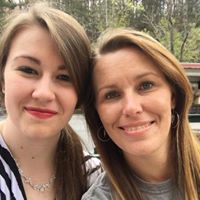Kimberly Ann Tipton
age ~56
from San Francisco, CA
- Also known as:
-
- Kimberly A Tipton
- Phone and address:
-
745 Fillmore St, San Francisco, CA 94117
(415)6748072
Kimberly Tipton Phones & Addresses
- 745 Fillmore St, San Francisco, CA 94117 • (415)6748072
- 174 Downey St, San Francisco, CA 94117 • (415)6812405
- 525 Cole St, San Francisco, CA 94117 • (415)3796623
- 50 W Broadway APT 618, South Boston, MA 02127
- Lebanon, NH
- Austin, TX
- 450 Ortega St, San Francisco, CA 94122
Work
-
Position:Clerical/White Collar
Resumes

Kimberly Tipton
view source
Kimberly Tipton
view source
Human Resources Manager
view sourceWork:
Human Resources Manager

Kimberly Tipton
view source
Kimberly Tipton
view source
Kimberly Tipton
view sourceUs Patents
-
Modified Urokinase-Type Plasminogen Activator Polypeptides And Methods Of Use
view source -
US Patent:20210222143, Jul 22, 2021
-
Filed:Jan 3, 2020
-
Appl. No.:16/734256
-
Inventors:- South San Francisco CA, US
Christopher Thanos - Tiburon CA, US
Vanessa Soros - San Francisco CA, US
Mikhail Popkov - San Diego CA, US
Kimberly Tipton - Boston MA, US
Matthew John Traylor - Boulder CO, US
Eric Steven Furfine - Lincoln MA, US
Jeffrey Charles Way - Cambridge MA, US -
International Classification:C12N 9/72
C07K 14/765 -
Abstract:Provided are u-PA polypeptides and fusion proteins containing the u-PA polypeptides. The u-PA polypeptides are modified to have altered activity and/or specificity so that they cleave a complement protein, such as complement protein C3, to thereby inhibit complement activation. The modified u-PA polypeptides and fusion proteins that inhibit complement activation can be used for treatment of diseases and conditions that are mediated by complement activation, or in which complement activation plays a role. These disorders include ischemic and reperfusion disorders, including myocardial infarction and stroke, sepsis, autoimmune diseases, diabetic retinopathies, age-related macular degeneration, transplanted organ rejection, inflammatory diseases and diseases with an inflammatory component.
-
Thailanstatin Analogs
view source -
US Patent:20200216463, Jul 9, 2020
-
Filed:Sep 19, 2018
-
Appl. No.:16/648991
-
Inventors:Vasu JAMMALAMADAKA - Dublin CA, US
Kimberly Ann TIPTON - San Francisco CA, US
Sanjeev SATYAL - San Carlos CA, US
Hoyoung HUH - Portola Valley CA, US
- Seoul Jongno-Gu, KR -
Assignee:pH Pharma Co., Ltd. - Seoul
-
International Classification:C07D 493/10
A61K 47/68
A61P 35/00 -
Abstract:The invention provides novel cytotoxic compounds and cytotoxic conjugates comprising these cytotoxic compounds and cell-binding agents. More specifically, this invention relates to novel thailanstatin A analogs, useful as cytotoxic small molecule toxins in antibody-drug conjugates (ADCs). The present invention further relates to compositions including these cytotoxic compounds and ADCs, and methods for using these toxins and ADCs to treat pathological conditions including cancer.
-
Thailanstatin Analogs
view source -
US Patent:20190233430, Aug 1, 2019
-
Filed:Apr 5, 2019
-
Appl. No.:16/376540
-
Inventors:- Seoul, KR
Kimberly Ann Tipton - San Francisco CA, US
Sanjeev Satyal - San Carlos CA, US
Hoyoung Huh - Portola Valley CA, US -
Assignee:pH Pharma Co., Ltd. - Seoul
-
International Classification:C07D 493/10
A61P 35/00
C07D 493/04
A61K 45/06
A61K 47/68 -
Abstract:The invention provides novel cytotoxic compounds and cytotoxic conjugates comprising these cytotoxic compounds and cell-binding agents. More specifically, this invention relates to novel thailanstatin A analogs, useful as cytotoxic small molecule toxins in antibody-drug conjugates (ADCs). The present invention further relates to compositions including these cytotoxic compounds and ADCs, and methods for using these toxins and ADCs to treat pathological conditions including cancer.
-
Anti-Cd71 Antibodies, Activatable Anti-Cd71 Antibodies, And Methods Of Use Thereof
view source -
US Patent:20190202927, Jul 4, 2019
-
Filed:Nov 13, 2018
-
Appl. No.:16/189777
-
Inventors:- South San Francisco CA, US
Kimberly Ann Tipton - San Francisco CA, US
Jonathan Alexander Terrett - Lexington MA, US
Shweta Singh - Fremont CA, US
Annie Yang Weaver - San Mateo CA, US
Luc Roland Desnoyers - San Francisco CA, US -
International Classification:C07K 16/28
A61K 39/395
C07K 16/30
A61K 47/68
A61P 35/00
A61K 49/00 -
Abstract:The invention relates generally to antibodies that bind CD71, activatable antibodies that specifically bind to CD71 and methods of making and using these anti-CD71 antibodies and anti-CD71 activatable antibodies in a variety of therapeutic, diagnostic and prophylactic indications.
-
Thailanstatin Analogs
view source -
US Patent:20190084996, Mar 21, 2019
-
Filed:Sep 19, 2018
-
Appl. No.:16/135287
-
Inventors:- Seoul, KR
Kimberly Ann Tipton - San Francisco CA, US
Sanjeev Satyal - San Carlos CA, US
Hoyoung Huh - Portola Valley CA, US -
International Classification:C07D 493/10
A61P 35/00
A61K 47/68
A61K 45/06 -
Abstract:The invention provides novel cytotoxic compounds and cytotoxic conjugates comprising these cytotoxic compounds and cell-binding agents. More specifically, this invention relates to novel thailanstatin A analogs, useful as cytotoxic small molecule toxins in antibody-drug conjugates (ADCs). The present invention further relates to compositions including these cytotoxic compounds and ADCs, and methods for using these toxins and ADCs to treat pathological conditions including cancer.
-
Anti-Cd71 Antibodies, Activatable Anti-Cd71 Antibodies, And Methods Of Use Thereof
view source -
US Patent:20160355599, Dec 8, 2016
-
Filed:May 4, 2016
-
Appl. No.:15/146294
-
Inventors:- South San Francisco CA, US
Kimberly Ann Tipton - San Francisco CA, US
Jonathan Alexander Terrett - Cupertino CA, US
Shweta Singh - Fremont CA, US
Annie Yang Weaver - San Mateo CA, US
Luc Roland Desnoyers - San Francisco CA, US -
International Classification:C07K 16/28
A61K 39/395
A61K 49/00
A61K 47/48 -
Abstract:The invention relates generally to antibodies that bind CD71, activatable antibodies that specifically bind to CD71 and methods of making and using these anti-CD71 antibodies and anti-CD71 activatable antibodies in a variety of therapeutic, diagnostic and prophylactic indications.
Myspace

Kimberly Tipton
view sourceLocality:
Between Memphis, Tn & Oklahoma City
Gender:
Female
Birthday:
1944
Googleplus

Kimberly Tipton

Kimberly Tipton

Kimberly Tipton
Plaxo

Kimberly Tipton
view sourceResources for Human Development
Youtube
Classmates

Kimberly Thompson (Tipton)
view sourceSchools:
Prichard Elementary School Grayson KY 1992-1995
Community:
Regina Carpenter, Orville Gilreath
Biography:
Life
I am currently living in Shelbyville KY, which is definatly not far from Henry ...

Kimberly Tipton
view sourceSchools:
Prichard Elementary School Grayson KY 1992-1995
Community:
Crystal Kiser, Linda Qualls, Fred Applegate, Mary Hatchett

Kimberly Tipton
view sourceSchools:
White Station Elementary School Memphis TN 1993-1997, White Station High School Memphis TN 2000-2003
Community:
Bet Hood

Kimberly Goss (Tipton)
view sourceSchools:
Eisenhower High School Shelby Township MI 1974-1978
Community:
Sally Modzinski, David Bean

Kimberly Tipton
view sourceSchools:
Orange Park Christian Academy Orange Park FL 1999-2003

Kimberly Tipton
view sourceSchools:
New Miami High School Hamilton OH 2000-2004
Community:
Debbie Downey, Edward House, Melody Karr

Kimberly Butler (Tipton)
view sourceSchools:
Roberson High School Asheville NC 1983-1987
Community:
Beverly Crosby, Gary Hart, Joe Byrd, Robin Crockett, Diane Felkel, Kim Mcguire, Jeannie Edwards, Judy Hare, Pam Ledbetter, Martha Reynolds

Prichard Elementary Schoo...
view sourceGraduates:
Kimberly Tipton (1992-1995),
Becky Staley (1987-1999),
Gary Hamilton (1963-1967),
Jeff Hambrick (1981-1987),
Jonathan Pennington (1998-2002)
Becky Staley (1987-1999),
Gary Hamilton (1963-1967),
Jeff Hambrick (1981-1987),
Jonathan Pennington (1998-2002)

Kimberly Hamilton Tipton
view source
Kimberly Tipton
view source
Kimberly Wilson Tipton
view source
Kimberly Inez Tipton
view source
Kimberly Ann Tipton
view source
Kimberly Tipton
view source
Kimberly Tipton
view source
Kimberly Tipton
view sourceGet Report for Kimberly Ann Tipton from San Francisco, CA, age ~56











